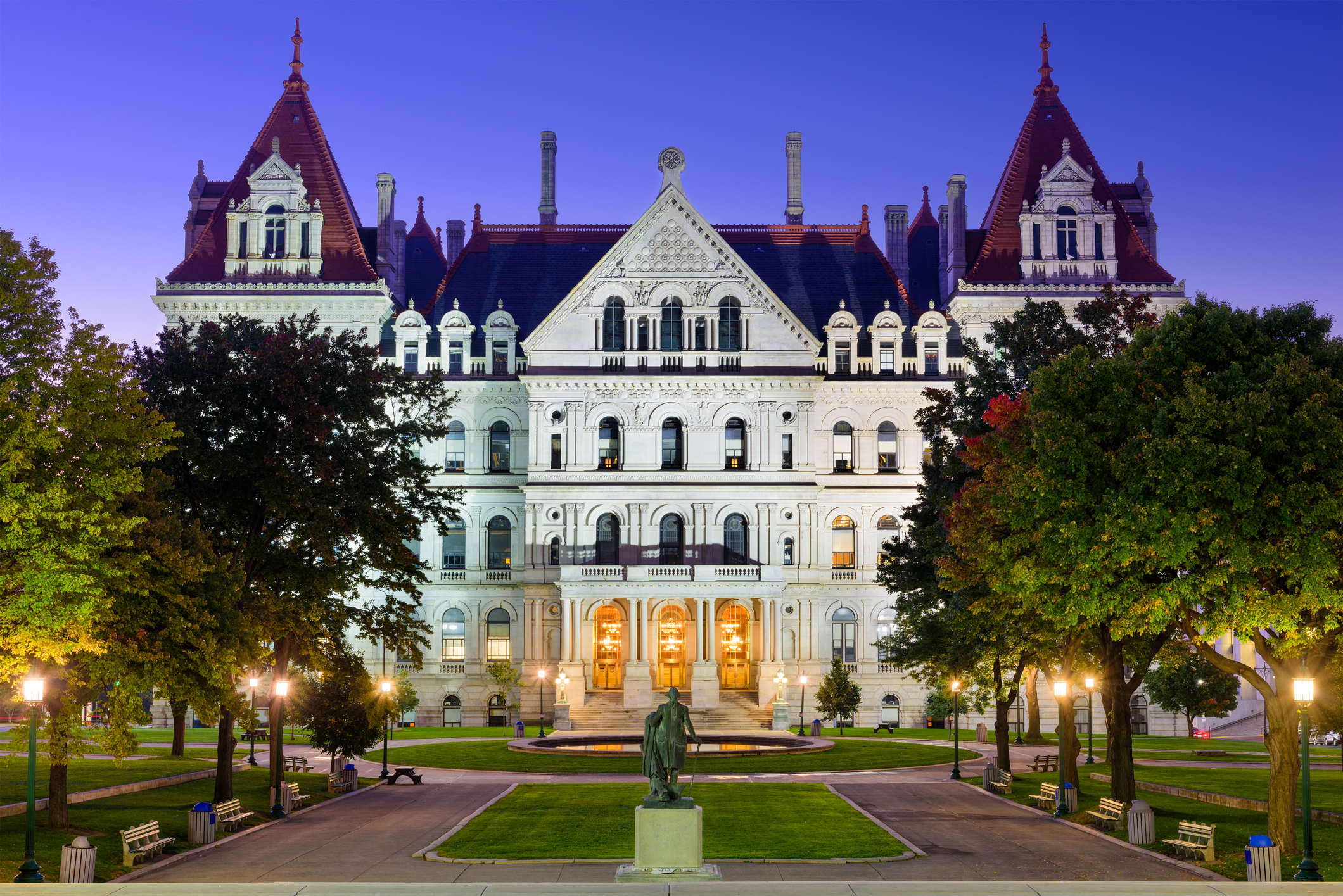Gov. Andrew M. Cuomo announced last week that he signed the New York Health and Essential Rights Act—also known as the NY HERO Act. The new law directs the New York State Department of Labor and the New York State Department of Health to create an enforceable health and safety model plan to prevent airborne, infectious diseases in the workplace. Based on these safety plans, all private employers in New York will be required to implement certain workplace safety protocols. However, it’s likely that chapter amendments will be established before the law goes into effect on Friday, June 4, 2021.
Effective dates
Currently, the DOL and DOH are required to issue industry-specific standards by Friday, June 4, 2021. After that date, employers will be required to implement the standards specific to their industry within 30 days.
Additionally, the law requires employers with at least 10 employees to permit their employees to create joint labor-management workplace safety committees, which would empower them to raise workplace health and safety concerns. This requirement is scheduled to go into effect Monday, Nov. 1, 2021.
Changes still are possible
It is likely that many of the provisions of the NY HERO Act will be changed soon. As he signed the legislation, Cuomo promised that there would be chapter amendments to the new law, which would ease the regulatory burden for many businesses.
To this end, the state Assembly introduced A.7477 on Tuesday, which would grant the DOL and the DOH more time to develop their industry-specific standards and ease some of the compliance burdens on employers. The state Senate is expected to introduce its own chapter amendments, as well.
The chapter amendments propose many changes to the NY HERO Act, including:
- The definition of worksite would be limited to locations over which an employer can exercise control.
- The commissioner of labor would be required to create a model airborne infectious disease exposure prevention standard for each industry that represents a significant portion of the workforce, or with unique characteristics that require distinct standards. Additionally, the commissioner would need to create a general model standard to capture all other worksites within 60 days
- Liquidated damages for civil actions for injunctive relief would be eliminated and a six-month statute of limitations would be added for such actions.
- Employees would be required to notify their employers of alleged violations and they would be required to provide employers with a 30-day cure period to correct such violations, during which employees would not be able to file a civil action.
- Courts would be allowed to award costs and attorney’s fees to employers if the court finds a civil action for injunctive relief or retaliation is frivolous.
- The joint labor-management workplace safety committees would be limited to one committee per worksite.
- Employers would be exempt if they already have an existing workplace safety committee that meets the minimum requirements of the law.
If A.7477 becomes law, private employers would have to comply with the DOL and DOH guidelines within 30 days of their release. You can track this and other bills with the PIAdvocacy bill tracker.

Bradford J. Lachut, Esq.
Bradford J. Lachut, Esq., joined PIA as government affairs counsel for the Government & Industry Affairs Department in 2012 and then, after a four-month leave, he returned to the association in 2018 as director of government & industry affairs responsible for all legal, government relations and insurance industry liaison programs for the five state associations. Prior to PIA, Brad worked as an attorney for Steven J. Baum PC, in Amherst, and as an associate attorney for the law office of James Morris in Buffalo. He also spent time serving as senior manager of government affairs as the Buffalo Niagara Partnership, a chamber of commerce serving the Buffalo, N.Y., region, his hometown. He received his juris doctorate from Buffalo Law School and his Bachelor of Science degree in Government and Politics from Utica College, Utica, N.Y. Brad is an active Mason and Shriner.
- Bradford J. Lachut, Esq.
- Bradford J. Lachut, Esq.
- Bradford J. Lachut, Esq.
- Bradford J. Lachut, Esq.
- Bradford J. Lachut, Esq.
- Bradford J. Lachut, Esq.
- Bradford J. Lachut, Esq.
- Bradford J. Lachut, Esq.
- Bradford J. Lachut, Esq.
- Bradford J. Lachut, Esq.
- Bradford J. Lachut, Esq.
- Bradford J. Lachut, Esq.
- Bradford J. Lachut, Esq.
- Bradford J. Lachut, Esq.
- Bradford J. Lachut, Esq.
- Bradford J. Lachut, Esq.
- Bradford J. Lachut, Esq.
- Bradford J. Lachut, Esq.
- Bradford J. Lachut, Esq.
- Bradford J. Lachut, Esq.
- Bradford J. Lachut, Esq.
- Bradford J. Lachut, Esq.
- Bradford J. Lachut, Esq.
- Bradford J. Lachut, Esq.
- Bradford J. Lachut, Esq.
- Bradford J. Lachut, Esq.
- Bradford J. Lachut, Esq.
- Bradford J. Lachut, Esq.
- Bradford J. Lachut, Esq.
- Bradford J. Lachut, Esq.
- Bradford J. Lachut, Esq.
- Bradford J. Lachut, Esq.
- Bradford J. Lachut, Esq.
- Bradford J. Lachut, Esq.
- Bradford J. Lachut, Esq.
- Bradford J. Lachut, Esq.
- Bradford J. Lachut, Esq.
- Bradford J. Lachut, Esq.
- Bradford J. Lachut, Esq.
- Bradford J. Lachut, Esq.
- Bradford J. Lachut, Esq.
- Bradford J. Lachut, Esq.
- Bradford J. Lachut, Esq.
- Bradford J. Lachut, Esq.
- Bradford J. Lachut, Esq.
- Bradford J. Lachut, Esq.
- Bradford J. Lachut, Esq.
- Bradford J. Lachut, Esq.
- Bradford J. Lachut, Esq.
- Bradford J. Lachut, Esq.
- Bradford J. Lachut, Esq.
- Bradford J. Lachut, Esq.
- Bradford J. Lachut, Esq.
- Bradford J. Lachut, Esq.
- Bradford J. Lachut, Esq.
- Bradford J. Lachut, Esq.
- Bradford J. Lachut, Esq.
- Bradford J. Lachut, Esq.
- Bradford J. Lachut, Esq.
- Bradford J. Lachut, Esq.
- Bradford J. Lachut, Esq.
- Bradford J. Lachut, Esq.
- Bradford J. Lachut, Esq.
- Bradford J. Lachut, Esq.
- Bradford J. Lachut, Esq.
- Bradford J. Lachut, Esq.
- Bradford J. Lachut, Esq.
- Bradford J. Lachut, Esq.
- Bradford J. Lachut, Esq.
- Bradford J. Lachut, Esq.
- Bradford J. Lachut, Esq.
- Bradford J. Lachut, Esq.
- Bradford J. Lachut, Esq.
- Bradford J. Lachut, Esq.
- Bradford J. Lachut, Esq.
- Bradford J. Lachut, Esq.
- Bradford J. Lachut, Esq.
- Bradford J. Lachut, Esq.
- Bradford J. Lachut, Esq.
- Bradford J. Lachut, Esq.
- Bradford J. Lachut, Esq.
- Bradford J. Lachut, Esq.
- Bradford J. Lachut, Esq.
- Bradford J. Lachut, Esq.
- Bradford J. Lachut, Esq.
- Bradford J. Lachut, Esq.
- Bradford J. Lachut, Esq.
- Bradford J. Lachut, Esq.
- Bradford J. Lachut, Esq.
- Bradford J. Lachut, Esq.
- Bradford J. Lachut, Esq.
- Bradford J. Lachut, Esq.
- Bradford J. Lachut, Esq.
- Bradford J. Lachut, Esq.
- Bradford J. Lachut, Esq.
- Bradford J. Lachut, Esq.
- Bradford J. Lachut, Esq.
- Bradford J. Lachut, Esq.
- Bradford J. Lachut, Esq.
- Bradford J. Lachut, Esq.
- Bradford J. Lachut, Esq.
- Bradford J. Lachut, Esq.
- Bradford J. Lachut, Esq.
- Bradford J. Lachut, Esq.
- Bradford J. Lachut, Esq.
- Bradford J. Lachut, Esq.
- Bradford J. Lachut, Esq.
- Bradford J. Lachut, Esq.
- Bradford J. Lachut, Esq.
- Bradford J. Lachut, Esq.
- Bradford J. Lachut, Esq.
- Bradford J. Lachut, Esq.
- Bradford J. Lachut, Esq.
- Bradford J. Lachut, Esq.
- Bradford J. Lachut, Esq.
- Bradford J. Lachut, Esq.
- Bradford J. Lachut, Esq.
- Bradford J. Lachut, Esq.
- Bradford J. Lachut, Esq.
- Bradford J. Lachut, Esq.
- Bradford J. Lachut, Esq.
- Bradford J. Lachut, Esq.
- Bradford J. Lachut, Esq.
- Bradford J. Lachut, Esq.
- Bradford J. Lachut, Esq.
- Bradford J. Lachut, Esq.
- Bradford J. Lachut, Esq.
- Bradford J. Lachut, Esq.
- Bradford J. Lachut, Esq.
- Bradford J. Lachut, Esq.
- Bradford J. Lachut, Esq.
- Bradford J. Lachut, Esq.
- Bradford J. Lachut, Esq.
- Bradford J. Lachut, Esq.
- Bradford J. Lachut, Esq.
- Bradford J. Lachut, Esq.
- Bradford J. Lachut, Esq.
- Bradford J. Lachut, Esq.
- Bradford J. Lachut, Esq.
- Bradford J. Lachut, Esq.
- Bradford J. Lachut, Esq.
- Bradford J. Lachut, Esq.
- Bradford J. Lachut, Esq.
- Bradford J. Lachut, Esq.
- Bradford J. Lachut, Esq.
- Bradford J. Lachut, Esq.
- Bradford J. Lachut, Esq.
- Bradford J. Lachut, Esq.
- Bradford J. Lachut, Esq.
- Bradford J. Lachut, Esq.
- Bradford J. Lachut, Esq.
- Bradford J. Lachut, Esq.
- Bradford J. Lachut, Esq.
- Bradford J. Lachut, Esq.
- Bradford J. Lachut, Esq.
- Bradford J. Lachut, Esq.
- Bradford J. Lachut, Esq.
- Bradford J. Lachut, Esq.
- Bradford J. Lachut, Esq.
- Bradford J. Lachut, Esq.
- Bradford J. Lachut, Esq.
- Bradford J. Lachut, Esq.
- Bradford J. Lachut, Esq.
- Bradford J. Lachut, Esq.
- Bradford J. Lachut, Esq.
- Bradford J. Lachut, Esq.
- Bradford J. Lachut, Esq.
- Bradford J. Lachut, Esq.
- Bradford J. Lachut, Esq.
- Bradford J. Lachut, Esq.
- Bradford J. Lachut, Esq.
- Bradford J. Lachut, Esq.
- Bradford J. Lachut, Esq.
- Bradford J. Lachut, Esq.
- Bradford J. Lachut, Esq.
- Bradford J. Lachut, Esq.
- Bradford J. Lachut, Esq.
- Bradford J. Lachut, Esq.
- Bradford J. Lachut, Esq.
- Bradford J. Lachut, Esq.
- Bradford J. Lachut, Esq.
- Bradford J. Lachut, Esq.
- Bradford J. Lachut, Esq.
- Bradford J. Lachut, Esq.
- Bradford J. Lachut, Esq.
- Bradford J. Lachut, Esq.
- Bradford J. Lachut, Esq.
- Bradford J. Lachut, Esq.
- Bradford J. Lachut, Esq.
- Bradford J. Lachut, Esq.
- Bradford J. Lachut, Esq.
- Bradford J. Lachut, Esq.
- Bradford J. Lachut, Esq.
- Bradford J. Lachut, Esq.
- Bradford J. Lachut, Esq.
- Bradford J. Lachut, Esq.
- Bradford J. Lachut, Esq.
- Bradford J. Lachut, Esq.
- Bradford J. Lachut, Esq.
- Bradford J. Lachut, Esq.
- Bradford J. Lachut, Esq.
- Bradford J. Lachut, Esq.
- Bradford J. Lachut, Esq.
- Bradford J. Lachut, Esq.
- Bradford J. Lachut, Esq.
- Bradford J. Lachut, Esq.
- Bradford J. Lachut, Esq.
- Bradford J. Lachut, Esq.
- Bradford J. Lachut, Esq.
- Bradford J. Lachut, Esq.
- Bradford J. Lachut, Esq.
- Bradford J. Lachut, Esq.
- Bradford J. Lachut, Esq.
- Bradford J. Lachut, Esq.
- Bradford J. Lachut, Esq.
- Bradford J. Lachut, Esq.
- Bradford J. Lachut, Esq.
- Bradford J. Lachut, Esq.
- Bradford J. Lachut, Esq.
- Bradford J. Lachut, Esq.
- Bradford J. Lachut, Esq.
- Bradford J. Lachut, Esq.
- Bradford J. Lachut, Esq.
- Bradford J. Lachut, Esq.
- Bradford J. Lachut, Esq.
- Bradford J. Lachut, Esq.
- Bradford J. Lachut, Esq.
- Bradford J. Lachut, Esq.
- Bradford J. Lachut, Esq.
- Bradford J. Lachut, Esq.
- Bradford J. Lachut, Esq.
- Bradford J. Lachut, Esq.
- Bradford J. Lachut, Esq.
- Bradford J. Lachut, Esq.
- Bradford J. Lachut, Esq.
- Bradford J. Lachut, Esq.
- Bradford J. Lachut, Esq.
- Bradford J. Lachut, Esq.
- Bradford J. Lachut, Esq.
- Bradford J. Lachut, Esq.
- Bradford J. Lachut, Esq.
- Bradford J. Lachut, Esq.
- Bradford J. Lachut, Esq.
- Bradford J. Lachut, Esq.
- Bradford J. Lachut, Esq.
- Bradford J. Lachut, Esq.
- Bradford J. Lachut, Esq.
- Bradford J. Lachut, Esq.
- Bradford J. Lachut, Esq.
- Bradford J. Lachut, Esq.
- Bradford J. Lachut, Esq.
- Bradford J. Lachut, Esq.
- Bradford J. Lachut, Esq.
- Bradford J. Lachut, Esq.
- Bradford J. Lachut, Esq.
- Bradford J. Lachut, Esq.
- Bradford J. Lachut, Esq.
- Bradford J. Lachut, Esq.
- Bradford J. Lachut, Esq.
- Bradford J. Lachut, Esq.
- Bradford J. Lachut, Esq.
- Bradford J. Lachut, Esq.
- Bradford J. Lachut, Esq.
- Bradford J. Lachut, Esq.
- Bradford J. Lachut, Esq.
- Bradford J. Lachut, Esq.
- Bradford J. Lachut, Esq.
- Bradford J. Lachut, Esq.
- Bradford J. Lachut, Esq.
- Bradford J. Lachut, Esq.
- Bradford J. Lachut, Esq.
- Bradford J. Lachut, Esq.
- Bradford J. Lachut, Esq.
- Bradford J. Lachut, Esq.
- Bradford J. Lachut, Esq.
- Bradford J. Lachut, Esq.
- Bradford J. Lachut, Esq.
- Bradford J. Lachut, Esq.
- Bradford J. Lachut, Esq.
- Bradford J. Lachut, Esq.
- Bradford J. Lachut, Esq.
- Bradford J. Lachut, Esq.
- Bradford J. Lachut, Esq.
- Bradford J. Lachut, Esq.
- Bradford J. Lachut, Esq.
- Bradford J. Lachut, Esq.
- Bradford J. Lachut, Esq.
- Bradford J. Lachut, Esq.
- Bradford J. Lachut, Esq.
- Bradford J. Lachut, Esq.
- Bradford J. Lachut, Esq.
- Bradford J. Lachut, Esq.
- Bradford J. Lachut, Esq.
- Bradford J. Lachut, Esq.
- Bradford J. Lachut, Esq.
- Bradford J. Lachut, Esq.
- Bradford J. Lachut, Esq.
- Bradford J. Lachut, Esq.
- Bradford J. Lachut, Esq.
- Bradford J. Lachut, Esq.
- Bradford J. Lachut, Esq.
- Bradford J. Lachut, Esq.
- Bradford J. Lachut, Esq.
- Bradford J. Lachut, Esq.
- Bradford J. Lachut, Esq.
- Bradford J. Lachut, Esq.
- Bradford J. Lachut, Esq.





